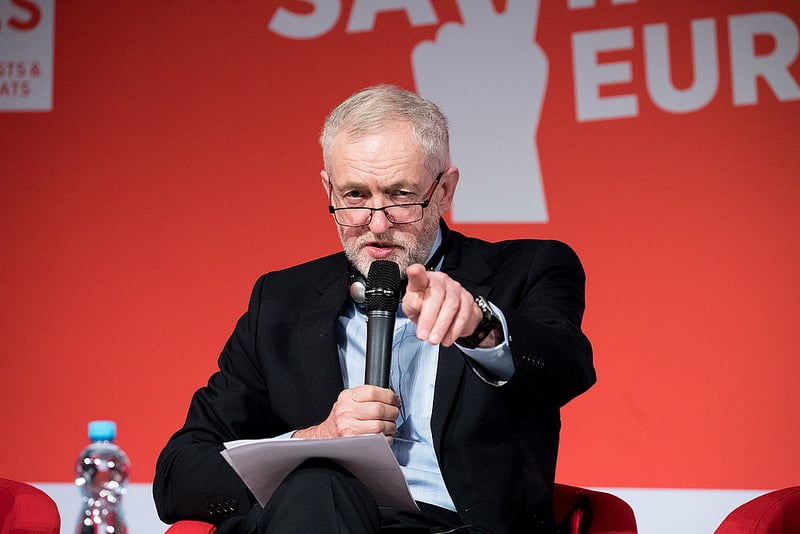
Jeremy Corbyn, Labour leader
Photo: Party of European Socialists via Visual Hunt / CC
Labour manifesto promises to deliver culture for all
Labour’s draft manifesto outlines plans to put creativity at the heart of education and make a £1bn investment in ‘creative clusters’, but offers no increases in direct funding for the arts.
A pledge to deliver “culture for all” is among a raft of proposals put forward in Labour’s draft manifesto for the forthcoming general election.
The manifesto presents a series of measures that will “do more to open the arts and creative industries to everyone,” although it makes no commitment to increasing direct government funding.
Instead, it sets out a series of aims for culture and the creative industries, including:
- maintaining free entry to museums and investing in museums and the heritage sector
- ending cuts to local authority budgets to support the provision of libraries, museums and galleries
- taking steps to widen the reach of the Government Art Collection
- considering an extension of the £1,000 pub relief business rates scheme to small music venues.
Investment strategy
The manifesto identifies the creative industries as “the envy of the world, a source of national pride, a driver of inward investment and tourism and a symbol of the kind of country we are now and aspire to be in the future”. As Britain prepares to leave the EU, it states that Labour will “put our world-class creative sector at the heart of our negotiations and future industrial strategy”.
The manifesto makes no mention of the increases in direct funding announced by leader Jeremy Corbyn during his leadership campaign last year. At that point he pledged to reverse the Conservatives’ cuts to arts, libraries, theatres and museums.
Instead, investment in the arts is now proposed in the form of a five-year £1bn ‘Cultural Capital Fund’, administered by Arts Council England, that will invest in creative clusters across the country.
Labour is proposing a similar model to that applied in enterprise zones, aiming to upgrade cultural and creative infrastructure “to be ready for the digital age”. The fund would be available over a five-year period, and would be “among the biggest arts infrastructure funds ever, transforming the country’s cultural landscape”. Its main focus would be on “projects that could increase museums’ and galleries’ income and viability”.
Whilst Labour will guarantee to cover any shortfall in EU Structural Funding that occurs as a result of Brexit, there is no such commitment to Creative Europe, the European Commission’s seven-year funding programme for the cultural and creative sectors, which was launched in 2014 and will extend beyond the date when Britain is due to leave the EU.
EBacc review
Arts in education is highlighted, with Labour promising to “put creativity back at the heart of the curriculum”.
Although there is no firm commitment to introducing an arts element to the English Baccalaureate (EBacc), the schools’ performance measure would be reviewed to “stop the arts being side-lined from secondary education”. The manifesto states: “We will not improve standards at the expense of narrowing the curriculum.” A Labour-led education system would, it says, “enable each to find their path through a breadth of choice in courses and qualifications”.
If elected, the party will introduce an arts pupil premium to every primary school in England: “A £160m per year boost for schools to invest in projects that will support cultural activities for schools over the longer-term.”
Employment issues
To boost employment in the cultural sector, Labour says it will launch a nationwide creative careers advice campaign in schools, “to demonstrate the range of careers and opportunities available and the skills required in the creative industries, from the tech sector to theatre production.”
The manifesto notes that “being a performer is a great career, but too often the culture of low or no pay means it is hard for those without well-off families to support them”. Labour says it will work with trade unions and employers to agree sector specific advice and guidelines on pay and employment standards that will “make the sector more accessible to all”. Finding “rapid solutions to improve diversity” is seen as a priority.
Freelance workers in the arts could be affected by the party’s pledge to “clamp down on bogus self-employment”. It plans to shift the burden of proof relating to freelance status, “so that the law assumes a worker is an employee unless the employer can prove otherwise”. This measure, it says, is in response to “mounting evidence that workers are being forced into self-employment by unscrupulous employers to avoid costs and their duties to workers”.
Join the Discussion
You must be logged in to post a comment.